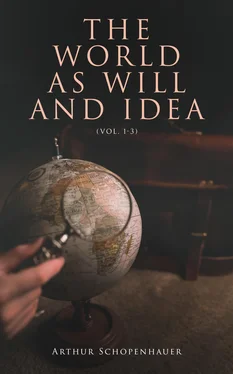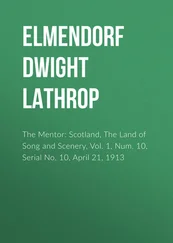This exaltation must not only be consciously won, but also consciously retained, and it is therefore accompanied by a constant remembrance of will; yet not of a single particular volition, such as fear or desire, but of human volition in general, so far as it is universally expressed in its objectivity the human body. If a single real act of will were to come into consciousness, through actual personal pressure and danger from the object, then the individual will thus actually influenced would at once gain the upper hand, the peace of contemplation would become impossible, the impression of the sublime would be lost, because it yields to the anxiety, in which the effort of the individual to right itself has sunk every other thought. A few examples will help very much to elucidate this theory of the æsthetic sublime and remove all doubt with regard to it; at the same time they will bring out the different degrees of this sense of the sublime. It is in the main identical with that of the beautiful, with pure will-less knowing, and the knowledge, that necessarily accompanies it of Ideas out of all relation determined by the principle of sufficient reason, and it is distinguished from the sense of the beautiful only by the additional quality that it rises above the known hostile relation of the object contemplated to the will in general. Thus there come to be various degrees of the sublime, and transitions from the beautiful to the sublime, according as this additional quality is strong, bold, urgent, near, or weak, distant, and merely indicated. I think it is more in keeping with the plan of my treatise, first to give examples of these transitions, and of the weaker degrees of the impression of the sublime, although persons whose æsthetical susceptibility in general is not very great, and whose imagination is not very lively, will only understand the examples given later of the higher and more distinct grades of that impression; and they should therefore confine themselves to these, and pass over the examples of the very weak degrees of the sublime that are to be given first.
As man is at once impetuous and blind striving of will (whose pole or focus lies in the genital organs), and eternal, free, serene subject of pure knowing (whose pole is the brain); so, corresponding to this antithesis, the sun is both the source of light , the condition of the most perfect kind of knowledge, and therefore of the most delightful of things—and the source of warmth , the first condition of life, i.e., of all phenomena of will in its higher grades. Therefore, what warmth is for the will, light is for knowledge. Light is the largest gem in the crown of beauty, and has the most marked influence on the knowledge of every beautiful object. Its presence is an indispensable condition of beauty; its favourable disposition increases the beauty of the most beautiful. Architectural beauty more than any other object is enhanced by favourable light, though even the most insignificant things become through its influence most beautiful. If, in the dead of winter, when all nature is frozen and stiff, we see the rays of the setting sun reflected by masses of stone, illuminating without warming, and thus favourable only to the purest kind of knowledge, not to the will; the contemplation of the beautiful effect of the light upon these masses lifts us, as does all beauty, into a state of pure knowing. But, in this case, a certain transcending of the interests of the will is needed to enable us to rise into the state of pure knowing, because there is a faint recollection of the lack of warmth from these rays, that is, an absence of the principle of life; there is a slight challenge to persist in pure knowing, and to refrain from all willing, and therefore it is an example of a transition from the sense of the beautiful to that of the sublime. It is the faintest trace of the sublime in the beautiful; and beauty itself is indeed present only in a slight degree. The following is almost as weak an example.
Let us imagine ourselves transported to a very lonely place, with unbroken horizon, under a cloudless sky, trees and plants in the perfectly motionless air, no animals, no men, no running water, the deepest silence. Such surroundings are, as it were, a call to seriousness and contemplation, apart from all will and its cravings; but this is just what imparts to such a scene of desolate stillness a touch of the sublime. For, because it affords no object, either favourable or unfavourable, for the will which is constantly in need of striving and attaining, there only remains the state of pure contemplation, and whoever is incapable of this, is ignominiously abandoned to the vacancy of unoccupied will, and the misery of ennui. So far it is a test of our intellectual worth, of which, generally speaking, the degree of our power of enduring solitude, or our love of it, is a good criterion. The scene we have sketched affords us, then, an example of the sublime in a low degree, for in it, with the state of pure knowing in its peace and all-sufficiency, there is mingled, by way of contrast, the recollection of the dependence and poverty of the will which stands in need of constant action. This is the species of the sublime for which the sight of the boundless prairies of the interior of North America is celebrated.
But let us suppose such a scene, stripped also of vegetation, and showing only naked rocks; then from the entire absence of that organic life which is necessary for existence, the will at once becomes uneasy, the desert assumes a terrible aspect, our mood becomes more tragic; the elevation to the sphere of pure knowing takes place with a more decided tearing of ourselves away from the interests of the will; and because we persist in continuing in the state of pure knowing, the sense of the sublime distinctly appears.
The following situation may occasion this feeling in a still higher degree: Nature convulsed by a storm; the sky darkened by black threatening thunder-clouds; stupendous, naked, overhanging cliffs, completely shutting out the view; rushing, foaming torrents; absolute desert; the wail of the wind sweeping through the clefts of the rocks. Our dependence, our strife with hostile nature, our will broken in the conflict, now appears visibly before our eyes. Yet, so long as the personal pressure does not gain the upper hand, but we continue in æsthetic contemplation, the pure subject of knowing gazes unshaken and unconcerned through that strife of nature, through that picture of the broken will, and quietly comprehends the Ideas even of those objects which are threatening and terrible to the will. In this contrast lies the sense of the sublime.
But the impression becomes still stronger, if, when we have before our eyes, on a large scale, the battle of the raging elements, in such a scene we are prevented from hearing the sound of our own voice by the noise of a falling stream; or, if we are abroad in the storm of tempestuous seas, where the mountainous waves rise and fall, dash themselves furiously against steep cliffs, and toss their spray high into the air; the storm howls, the sea boils, the lightning flashes from black clouds, and the peals of thunder drown the voice of storm and sea. Then, in the undismayed beholder, the two-fold nature of his consciousness reaches the highest degree of distinctness. He perceives himself, on the one hand, as an individual, as the frail phenomenon of will, which the slightest touch of these forces can utterly destroy, helpless against powerful nature, dependent, the victim of chance, a vanishing nothing in the presence of stupendous might; and, on the other hand, as the eternal, peaceful, knowing subject, the condition of the object, and, therefore, the supporter of this whole world; the terrific strife of nature only his idea; the subject itself free and apart from all desires and necessities, in the quiet comprehension of the Ideas. This is the complete impression of the sublime. Here he obtains a glimpse of a power beyond all comparison superior to the individual, threatening it with annihilation.
Читать дальше












